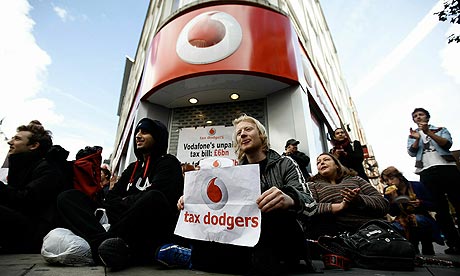UK Uncut protesters spied upon by undercover police
At least two plain-clothes officers of Met police's Forward Intelligence Teams spotted at London tax avoidance protest

Scotland Yard has deployed undercover officers to spy on a network of activists whose viral campaign against tax avoiders threatens to close down hundreds of shops in the run-up to Christmas.
The surveillance officers were first used at a protest in October, the Guardian can reveal, despite an assurance given to parliament last year that only officers in full uniform gather intelligence at protests.
The group being monitored, UK Uncut, will target high-street stores in 16 cities tomorrow, in its latest attempt to draw attention to the estimated £25bn the Treasury loses each year in tax avoidance.
Last year the Guardian's tax gap investigation found taxpayers had to plug a multibillion-pound hole in the public finances as hundreds of the biggest companies increasingly employed complex and secretive tax arrangements.
In recent weeks activists inspired by UK Uncut closed more than 30 Vodafone shops after the campaign went viral through the use of a Twitter hashtag – #ukuncut – which helps users share messages.
Sir Philip Green, the retail billionaire and efficiency adviser to the government, has become UK Uncut's latest target, with stores in his Arcadia Group – including Topshop, Dorothy Perkins, Burton and Miss Selfridge – being targeted tomorrow.
Green banked the biggest pay cheque in corporate history in 2005 when his business paid a £1.2bn dividend to his wife, Tina, who resides in the tax haven of Monaco. He has previously said his affairs are "not relevant" and that he pays "tens and tens of millions of pounds" in tax.Other companies that will be targeted by protesters tomorrow are Boots, Barclays, Lloyds and HSBC.
The transformation of UK Uncut from a pub gathering to a potential network of upwards of 30,000 people in six weeks is a textbook example of how protesters mobilise through Twitter. It also reveals the lengths police are going to gather intelligence on the burgeoning movement.
It was in the Nags Head pub in north London that about 10 like-minded activists, many of them environmental campaigners and almost all in their 20s, hatched the idea of targeting alleged tax avoiders.Discussing options to George Osborne's plans for £83bn of public spending cuts, which had been unveiled two days earlier, they decided a credible alternative was to clamp down on tax avoidance.
"It was the kind of conversation people were having at pubs across the country," said Neil, 26, one of those present. Another activist, a 26-year-old charity worker, added: "We just sort of said, in terms of the cuts, something needs to happen. The idea of the tax gap dispels the myth that there is no alternative to cuts."They put a message on the internet for people to participate in a direct action aimed at alleged tax avoiders on 27 October. Their target, a Vodafone store on Oxford Street, in central London, was chosen after internet research suggested the company avoided £6bn in tax. Both Vodafone and the tax office deny the accusation.
The night before the protest, the group created a Twitter account – @ukuncut – and the accompanying hashtag that would allow others to rally around the issue. The first tweet said: "This is the official Twitter account for tomorrow's direct action in London. Meet 9:30AM at the Ritz - look for the orange umbrella #UKuncut."
More than 60 people arrived the following morning at a rendezvous on Piccadilly. At least two undercover police officers working for the Met's Forward Intelligence Teams (FITs) were also present.Until then, FIT officers had always conducted "overt" surveillance with cameras. This time they were dressed as shoppers. A press photographer, Jonathan Warren, recognised one FIT officer and took their photograph. "They suddenly became very shy, as if I had spooked them, and then they just disappeared," he said. The use of undercover officers in this way appears to be new.
Responding to previous reports that plain-clothes officers were deployed at the G20 protests last year, Commander Bob Broadhurst, who runs the Met's public order unit CO11, told a parliamentary committee in May last year: "The only officers we deploy for intelligence purposes at public order are forward intelligence team officers who are wearing full police uniforms with a yellow jacket with blue shoulders."
In a statement this week, the Met said plain-clothes officers were frequently deployed in "day to day" policing. "It is key that as a police service we observe and gather information to provide us with a relevant and up-to-date intelligence picture of what to expect in terms of protest groups and public order policing."
The first UK Uncut protest elicited interest across the UK, as far north as Kilmarnock, where one Twitter user, @johnniesloan, appeared to have begun a simultaneous copycat protest. He wrote: "Just stopped 2 folk going in the vodaphone shop in killie. Set up outside. #UkUncut."
Within 24 hours the idea of targeting Vodafone had spread to Leeds, where three stores were closed. By the weekend stores across the country were being occupied. The #ukuncut hashtag has been used tens of thousands of times since, including to help organise dozens of high-street store occupations and, most notably, three mass demonstrations against the government's plans to increase tuition fees.This week two mainstream anti-poverty organisations – the Jubilee Debt Campaign and War on Want – pledged to support UK Uncut. A third, the influential group Compass, announced today it would support tomorrow's protests.
"Over 15 times more is lost to tax avoidance at the top, than is lost to benefit fraud at the bottom," claimed its campaigns organiser, Joe Cox. "We want to make sure the government acts."There will be protests tomorrow in cities including London, Birmingham, Brighton, Bristol, Cambridge, Edinburgh, Glasgow, Leeds, Leicester, Liverpool, Nottingham, York and Sheffield.
